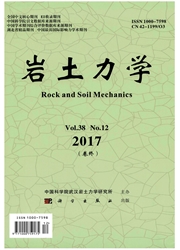

 中文摘要:
中文摘要:
通过对试验设备与工艺的改进,发展出一套比较有效的渗流.流变耦合试验方法。以多孔隙石灰岩为对象,研究了不同应力及水压作用下岩石试件的流变力学特性。试验结果显示,试件的应变总体上随偏应力及水压的提高而加大。在低应力作用下,垂向应变的变化量最大。提高应力后,渗流方向应变的增加趋势显著超过垂向。试件的渗透系数与体积变化具有相似规律,在低应力作用下,试件体积不断缩小,渗透系数也随之减小,此时增大水压会使试件进一步压缩。应力增大到某值后,体积逐步扩大而出现扩容,渗透系数也随之增大,此时增大水压会使扩容进一步增大。在各级应力作用下,试件的流变速率均有减速及稳定阶段。当应力较大时,会出现加速流变阶段导致破坏。
 英文摘要:
英文摘要:
An effectual method of seepage-rheology coupling experiment was developed by the improvement on test apparatus and technics. The theological properties of rock in seepage field under different stresses and water pressures were investigated by this method using porous limestone specimens. Based on the experimental results, the strain of specimen will increase along with the stress. The variation of vertical strain is larger than the other directions under lower stress; but when raising the stress level gradually, the strain of seepage direction will increase more remarkably. The results still show that the permeability coefficient and volume of the specimen have certain relation, the volume shrinkage of the specimen under lower stress will cause the decrease of permeability coefficient. When raising the stress to certain value, the volume of specimen will expand gradually; this so-called dilatancy effect will increase the permeability coefficient. If raising the water pressure, this variety of permeability coefficient and volume will be more notable. The rheological rate of specimen has deceleration and stable stage. The acceleration stage of rheological rate will appear and cause the specimen failure under certain high stress.
 同期刊论文项目
同期刊论文项目
 同项目期刊论文
同项目期刊论文
 期刊信息
期刊信息
